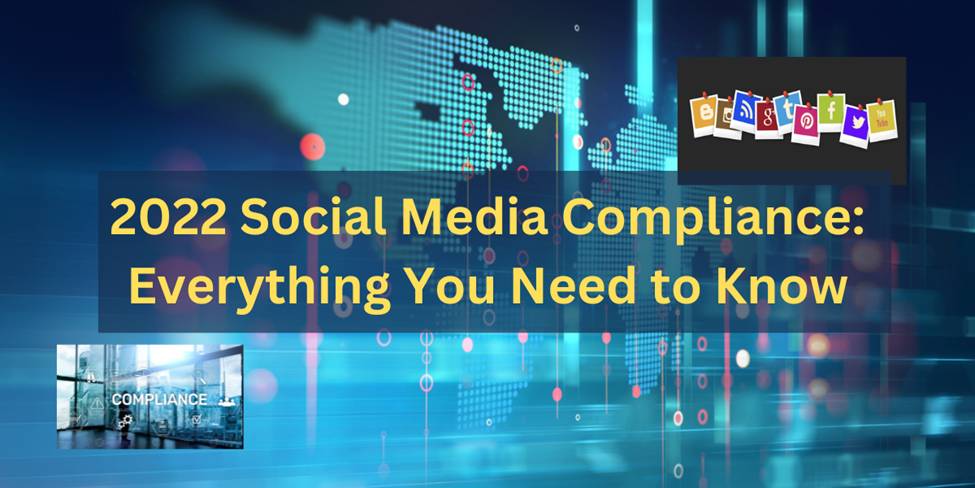Social media compliance is the practice of making sure that social media accounts abide by a company’s or organization’s rules and processes.
Social media compliance also ensures that you abide by the laws and regulations that apply to your industry. Note that regulatory compliance is essential for both company digital domains and employee digital properties.
What is Social Media Compliance?
Sure, compliance simply refers to adhering to the law. Social media compliance, however, is rarely straightforward in practice. The “rules” are a convoluted combination of business requirements and regional, national, and local laws.
Common Social Media Regulations: Who Enforces Them
Different social media compliance regulations and dangers apply based on industry and geography. Four main categories can be used to categorize the most prevalent.
- Privacy and Data Protection Regulations
Obligations for data protection and privacy generally include limiting the number of people who can be contacted by marketers. Also, to be clear about how data is collected and retained, and make sure users are aware of how their data is handled.
In this domain, there is a lot of legislation and regulation about consumer protection. Several pertinent laws include:
- CAN-SPAM (in the United States);
- The California Consumer Privacy Act;
- Canada’s Anti-Spam Laws (CCPA)
- Confidentiality Regulations
Sharing private information on social media may not only be inappropriate, but illegal, depending on the sector. Customer information must be handled with the utmost privacy. You may not distribute material or images without express permission.
Healthcare marketers, for instance, include images and videos for the identification of patients. Healthcare professionals need to be familiar with the Health Insurance Portability and Accountability Act (HIPAA). The HIPAA compliance manual creates regulations for the usage of patient health information.
Simply re-sharing a post without signed consent could violate HIPAA rules. Furthermore, the penalties may be severe.
- Marketing Regulations
To create a risk-free social media presence, social marketers need to be aware of marketing and ad regulations.
These may originate from organizations like the Federal Trade Commission and the Food and Drug Administration.
- Access Regulations
Accessibility standards generally aim to ensure that important information is available. Physicians and other healthcare professionals are required to appropriately preserve sensitive patient information. This info must comply with HIPAA regulations.
Businesses that handle sensitive data are required to follow stringent archiving requirements. They must safeguard sensitive data so that only those with permission can access it.
How to Stay Compliant on Social Media
- Understand the Industry Regulations
You probably have internal compliance specialists if you use social media for regulated businesses. They ought to be the first place you turn if you have any queries about what you may (and cannot) do on social media.
The most recent details on compliance standards are available from your compliance officers. You are up to date on social media tactics and technologies. Working together, the compliance and social media marketing teams can increase your brand’s advantages while lowering its dangers.
- Control Social Accounts Access
Who has access to your social media accounts must be known with certainty. Additionally, you must grant various team members various levels of access.
For instance, you might want several team members to be able to produce social media material. But before posting, you might need the principal’s permission.
Password sharing among team members introduces needless risk. When people quit their job, it’s very problematic. A method for managing passwords and permissions is necessary.
- Monitor Your Accounts
Without the aid of technology, manually tracking each point-of-presence (POP) can be time-consuming. It can also be prone to human mistakes.
Businesses must use technology to monitor and identify all branded and brand-related POPs. This will help to maintain compliance and provide accurate progress and compliance reporting.
Monitoring is crucial in industries that are subject to regulations. There might be a deadline for comments that you have to meet. Additionally, you might need to submit comments to a regulatory agency.
Additionally, it’s crucial to keep an eye out for social media profiles that are connected to your business but are not controlled by it.
- Create Content Libraries for Social Media
Your entire team can easily access compliant social media content, templates, and assets. This is due to a pre-approved content library. These can be disseminated via social media by staff members and independent contractors.
- Train Staff
Companies can prevent compliance violations by teaching their employees about social media compliance.
It is crucial to educate staff about what constitutes a violation of corporate policy and legal requirements. This can help defend the brand’s reputation and maintain compliance. A useful training technique is to provide templates and designs with compliant examples.
Include social media compliance training in the hiring process. Next, spend money on ongoing training upgrades. Make sure everyone is aware of the most recent advancements in your industry.
Cooperate with the compliance team. They can update you on recent legislative changes. You can inform them of the most recent developments in social marketing and social strategy. They can then warn of any fresh compliance risks.
- Create and Centralize a Social Media Governance Plan
A program for comprehensive governance includes compliance. Every department will be able to manage its portion of compliance activities with the aid of a strategic governance plan.
The ability to define and uphold global compliance is made possible by centralizing governance. Local staff members manage the daily tasks of posting and responding to customers. While corporate professionals supervise compliance adherence and offer guidance.
- Have an Appropriate Social Media Compliance Policy
Depending on your industry, different elements of your social media compliance policy will be required. It may truly cover a variety of policy categories, including:
- Social media guidelines: Internal social media activity is governed by this, which keeps your team compliant. Include pertinent laws and ordinances, and a description of societal roles and obligations.
- The policy on influencer compliance. Influencers are not likely to be very knowledgeable about compliance. Include clauses requiring compliance in your influencer contracts.
Benefits of Social Media Compliance
Businesses that are successful in achieving compliance on their social media platforms may benefit in several ways including:
- Protect the reputation of your business: Compliance can lessen the possibility of mistakes. These mistakes could harm your brand.
- Find Internal Risks: You can immediately identify risks posed by employees. These employees might be purposefully or accidentally breaching your social media policy. It ensures that appropriate checks and balances are in place.
- Improved customer trust: Compliance ensures improved consumer protection methods for social media risk management. This helps improve customer trust.
- Investigate fresh channels of communication: It provides safe participation in social media. This can position your business as an industry thought leader.
Conclusion
Legislative and regulatory organizations help establish social media regulations. These regulations foster economic innovation while safeguarding consumers. With social media compliance businesses may develop many social media profiles with a great brand and messaging.
HIPPA compliance also assists in getting rid of any inconsistent data or private information. This info might be present on social network profiles. Additionally, social media compliance aids in reducing both internal and external threats to the security of a brand.




